Critical Assessment: Can Working Memory Be Trained? Psychology Report
VerifiedAdded on 2020/06/05
|11
|3707
|323
Report
AI Summary
This report critically assesses the efficacy of working memory training programs. It explores the concept of working memory, its capacity, and its relation to intelligence, aging, and mental health. The report examines various studies and meta-analyses investigating the cognitive benefits of working memory training, including its potential to enhance cognitive skills and fluid intelligence. It delves into the dual-component model of working memory, exploring the roles of primary and secondary memory. Furthermore, the report evaluates different training paradigms, such as reduced recall accuracy thresholds, and discusses the potential for working memory training in addressing cognitive disorders like ADHD. The report also explores the nature of working memory, its role in cognitive development, and the transfer effects of training to untrained tasks. Various studies are analyzed, including those on children with ADHD and healthy adults, to evaluate the foundations and outcomes of working memory training, emphasizing its implications for cognitive development and improvements in skills like reading and mathematics. The report highlights the controversies and empirical disagreements surrounding this area of research.
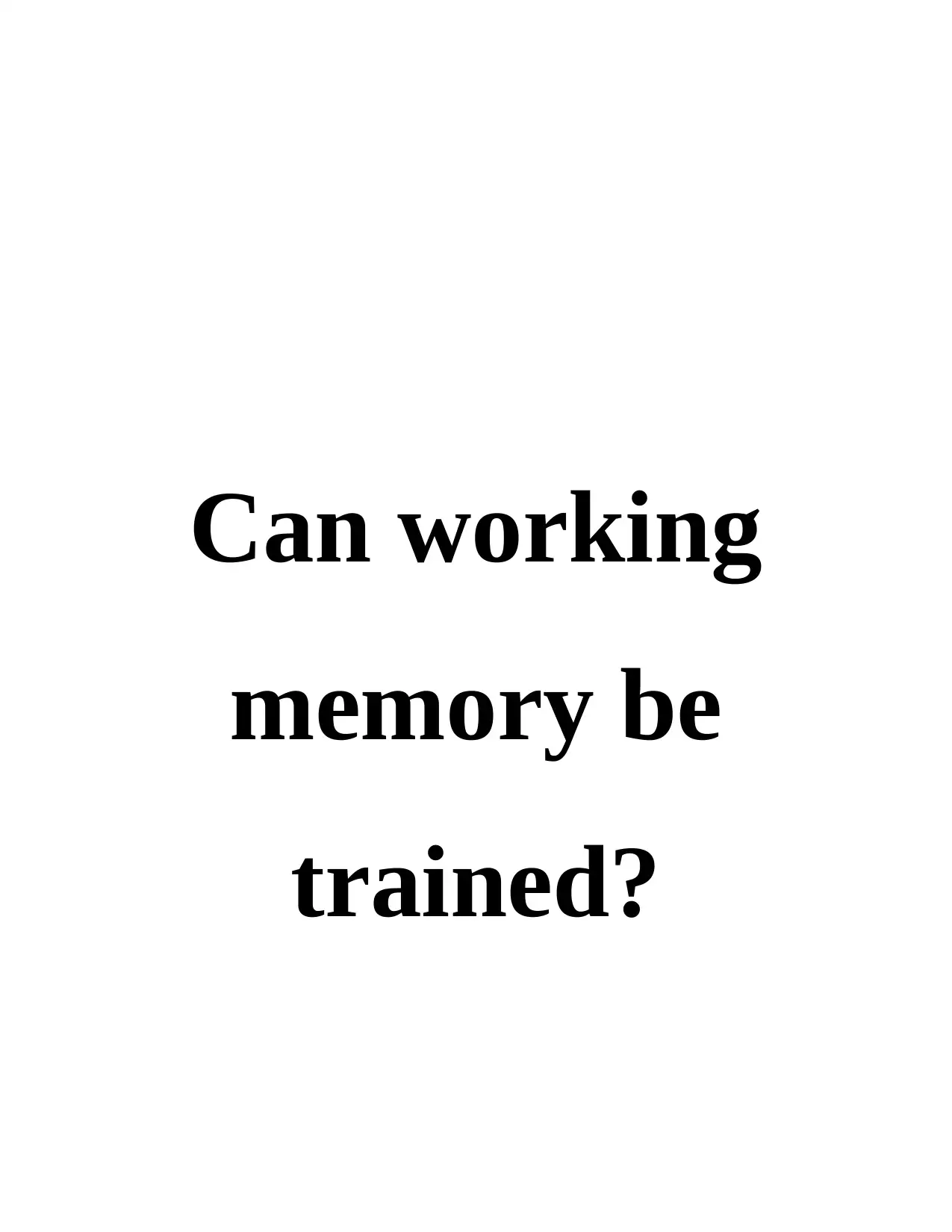
Can working
memory be
trained?
memory be
trained?
Paraphrase This Document
Need a fresh take? Get an instant paraphrase of this document with our AI Paraphraser
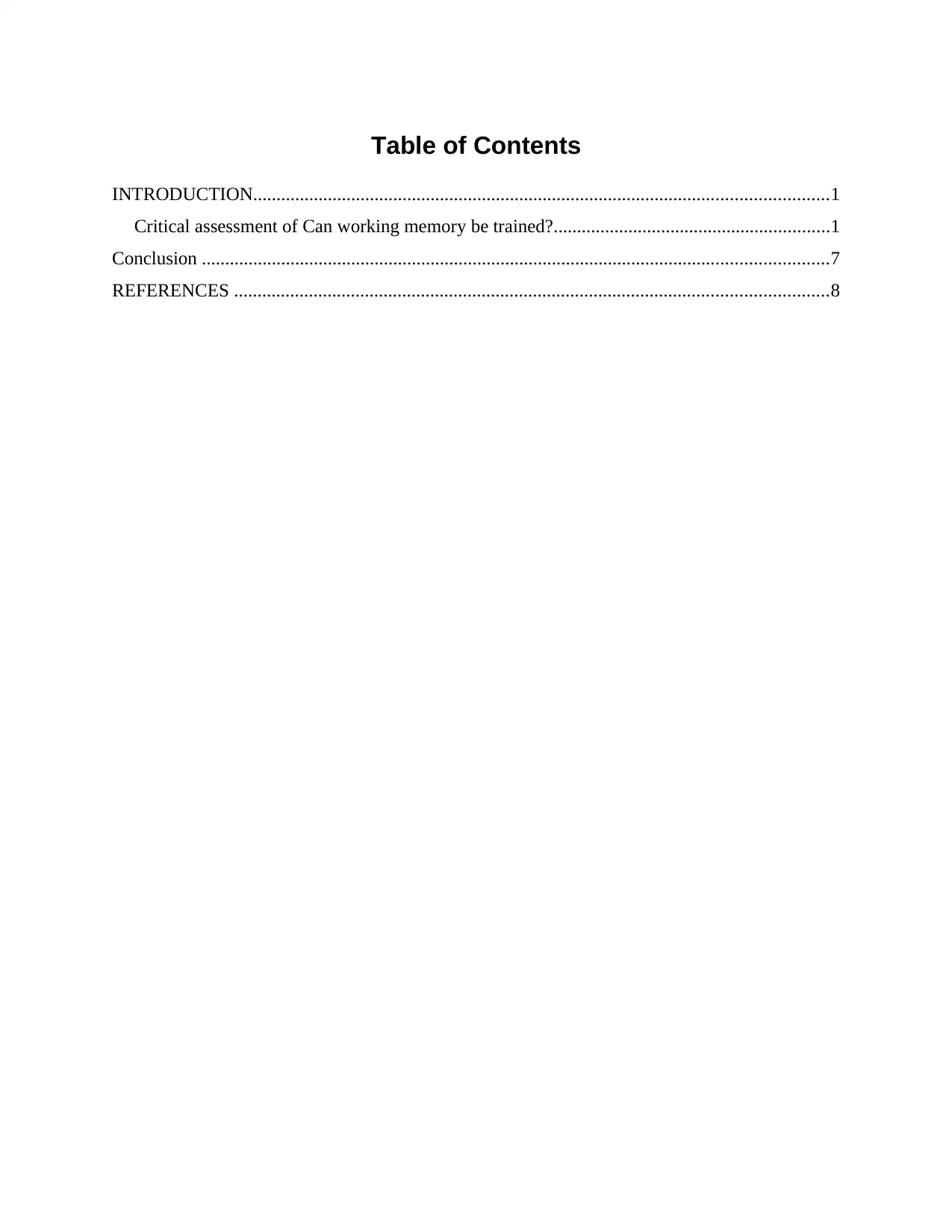
Table of Contents
INTRODUCTION...........................................................................................................................1
Critical assessment of Can working memory be trained?...........................................................1
Conclusion ......................................................................................................................................7
REFERENCES ...............................................................................................................................8
INTRODUCTION...........................................................................................................................1
Critical assessment of Can working memory be trained?...........................................................1
Conclusion ......................................................................................................................................7
REFERENCES ...............................................................................................................................8
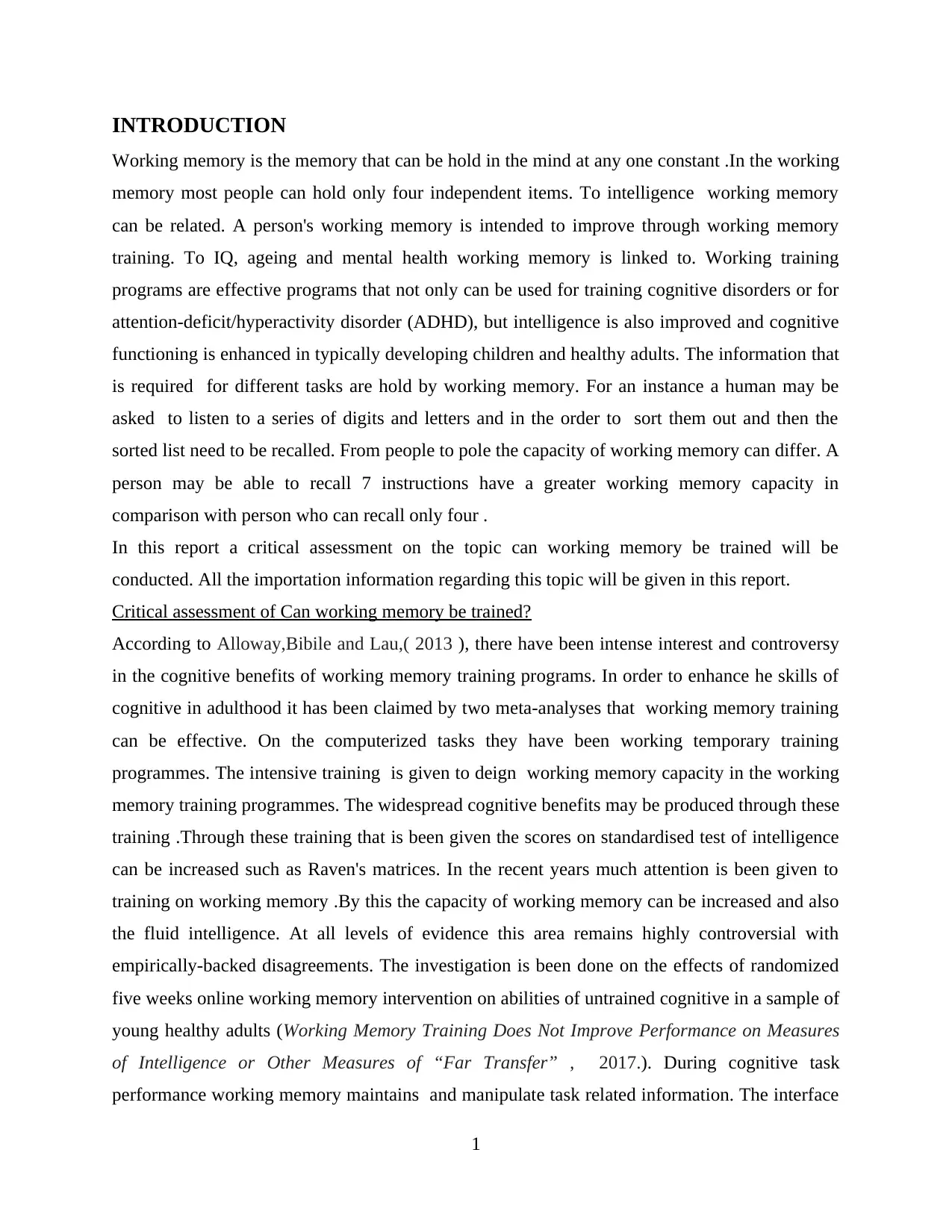
INTRODUCTION
Working memory is the memory that can be hold in the mind at any one constant .In the working
memory most people can hold only four independent items. To intelligence working memory
can be related. A person's working memory is intended to improve through working memory
training. To IQ, ageing and mental health working memory is linked to. Working training
programs are effective programs that not only can be used for training cognitive disorders or for
attention-deficit/hyperactivity disorder (ADHD), but intelligence is also improved and cognitive
functioning is enhanced in typically developing children and healthy adults. The information that
is required for different tasks are hold by working memory. For an instance a human may be
asked to listen to a series of digits and letters and in the order to sort them out and then the
sorted list need to be recalled. From people to pole the capacity of working memory can differ. A
person may be able to recall 7 instructions have a greater working memory capacity in
comparison with person who can recall only four .
In this report a critical assessment on the topic can working memory be trained will be
conducted. All the importation information regarding this topic will be given in this report.
Critical assessment of Can working memory be trained?
According to Alloway,Bibile and Lau,( 2013 ), there have been intense interest and controversy
in the cognitive benefits of working memory training programs. In order to enhance he skills of
cognitive in adulthood it has been claimed by two meta-analyses that working memory training
can be effective. On the computerized tasks they have been working temporary training
programmes. The intensive training is given to deign working memory capacity in the working
memory training programmes. The widespread cognitive benefits may be produced through these
training .Through these training that is been given the scores on standardised test of intelligence
can be increased such as Raven's matrices. In the recent years much attention is been given to
training on working memory .By this the capacity of working memory can be increased and also
the fluid intelligence. At all levels of evidence this area remains highly controversial with
empirically-backed disagreements. The investigation is been done on the effects of randomized
five weeks online working memory intervention on abilities of untrained cognitive in a sample of
young healthy adults (Working Memory Training Does Not Improve Performance on Measures
of Intelligence or Other Measures of “Far Transfer” , 2017.). During cognitive task
performance working memory maintains and manipulate task related information. The interface
1
Working memory is the memory that can be hold in the mind at any one constant .In the working
memory most people can hold only four independent items. To intelligence working memory
can be related. A person's working memory is intended to improve through working memory
training. To IQ, ageing and mental health working memory is linked to. Working training
programs are effective programs that not only can be used for training cognitive disorders or for
attention-deficit/hyperactivity disorder (ADHD), but intelligence is also improved and cognitive
functioning is enhanced in typically developing children and healthy adults. The information that
is required for different tasks are hold by working memory. For an instance a human may be
asked to listen to a series of digits and letters and in the order to sort them out and then the
sorted list need to be recalled. From people to pole the capacity of working memory can differ. A
person may be able to recall 7 instructions have a greater working memory capacity in
comparison with person who can recall only four .
In this report a critical assessment on the topic can working memory be trained will be
conducted. All the importation information regarding this topic will be given in this report.
Critical assessment of Can working memory be trained?
According to Alloway,Bibile and Lau,( 2013 ), there have been intense interest and controversy
in the cognitive benefits of working memory training programs. In order to enhance he skills of
cognitive in adulthood it has been claimed by two meta-analyses that working memory training
can be effective. On the computerized tasks they have been working temporary training
programmes. The intensive training is given to deign working memory capacity in the working
memory training programmes. The widespread cognitive benefits may be produced through these
training .Through these training that is been given the scores on standardised test of intelligence
can be increased such as Raven's matrices. In the recent years much attention is been given to
training on working memory .By this the capacity of working memory can be increased and also
the fluid intelligence. At all levels of evidence this area remains highly controversial with
empirically-backed disagreements. The investigation is been done on the effects of randomized
five weeks online working memory intervention on abilities of untrained cognitive in a sample of
young healthy adults (Working Memory Training Does Not Improve Performance on Measures
of Intelligence or Other Measures of “Far Transfer” , 2017.). During cognitive task
performance working memory maintains and manipulate task related information. The interface
1
⊘ This is a preview!⊘
Do you want full access?
Subscribe today to unlock all pages.

Trusted by 1+ million students worldwide
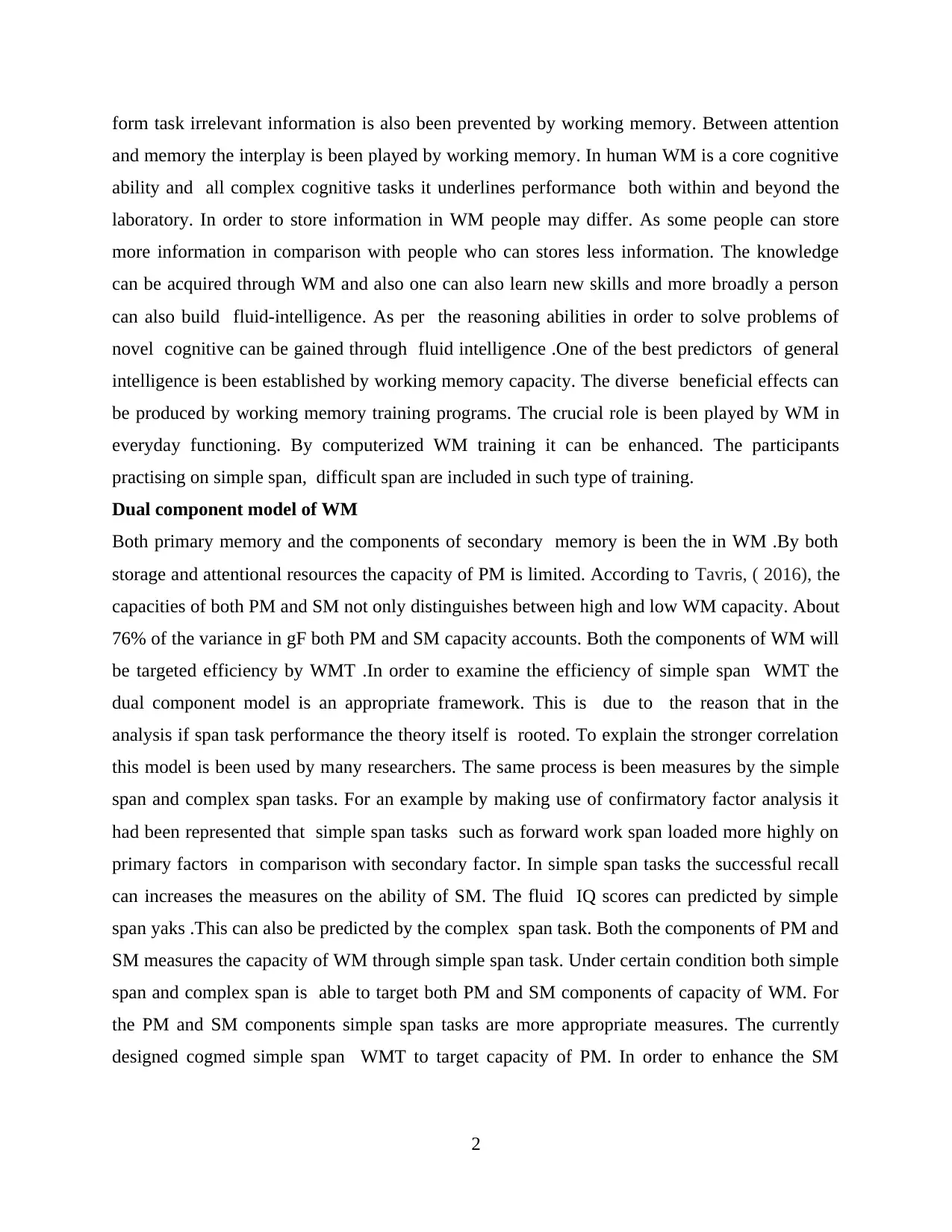
form task irrelevant information is also been prevented by working memory. Between attention
and memory the interplay is been played by working memory. In human WM is a core cognitive
ability and all complex cognitive tasks it underlines performance both within and beyond the
laboratory. In order to store information in WM people may differ. As some people can store
more information in comparison with people who can stores less information. The knowledge
can be acquired through WM and also one can also learn new skills and more broadly a person
can also build fluid-intelligence. As per the reasoning abilities in order to solve problems of
novel cognitive can be gained through fluid intelligence .One of the best predictors of general
intelligence is been established by working memory capacity. The diverse beneficial effects can
be produced by working memory training programs. The crucial role is been played by WM in
everyday functioning. By computerized WM training it can be enhanced. The participants
practising on simple span, difficult span are included in such type of training.
Dual component model of WM
Both primary memory and the components of secondary memory is been the in WM .By both
storage and attentional resources the capacity of PM is limited. According to Tavris, ( 2016), the
capacities of both PM and SM not only distinguishes between high and low WM capacity. About
76% of the variance in gF both PM and SM capacity accounts. Both the components of WM will
be targeted efficiency by WMT .In order to examine the efficiency of simple span WMT the
dual component model is an appropriate framework. This is due to the reason that in the
analysis if span task performance the theory itself is rooted. To explain the stronger correlation
this model is been used by many researchers. The same process is been measures by the simple
span and complex span tasks. For an example by making use of confirmatory factor analysis it
had been represented that simple span tasks such as forward work span loaded more highly on
primary factors in comparison with secondary factor. In simple span tasks the successful recall
can increases the measures on the ability of SM. The fluid IQ scores can predicted by simple
span yaks .This can also be predicted by the complex span task. Both the components of PM and
SM measures the capacity of WM through simple span task. Under certain condition both simple
span and complex span is able to target both PM and SM components of capacity of WM. For
the PM and SM components simple span tasks are more appropriate measures. The currently
designed cogmed simple span WMT to target capacity of PM. In order to enhance the SM
2
and memory the interplay is been played by working memory. In human WM is a core cognitive
ability and all complex cognitive tasks it underlines performance both within and beyond the
laboratory. In order to store information in WM people may differ. As some people can store
more information in comparison with people who can stores less information. The knowledge
can be acquired through WM and also one can also learn new skills and more broadly a person
can also build fluid-intelligence. As per the reasoning abilities in order to solve problems of
novel cognitive can be gained through fluid intelligence .One of the best predictors of general
intelligence is been established by working memory capacity. The diverse beneficial effects can
be produced by working memory training programs. The crucial role is been played by WM in
everyday functioning. By computerized WM training it can be enhanced. The participants
practising on simple span, difficult span are included in such type of training.
Dual component model of WM
Both primary memory and the components of secondary memory is been the in WM .By both
storage and attentional resources the capacity of PM is limited. According to Tavris, ( 2016), the
capacities of both PM and SM not only distinguishes between high and low WM capacity. About
76% of the variance in gF both PM and SM capacity accounts. Both the components of WM will
be targeted efficiency by WMT .In order to examine the efficiency of simple span WMT the
dual component model is an appropriate framework. This is due to the reason that in the
analysis if span task performance the theory itself is rooted. To explain the stronger correlation
this model is been used by many researchers. The same process is been measures by the simple
span and complex span tasks. For an example by making use of confirmatory factor analysis it
had been represented that simple span tasks such as forward work span loaded more highly on
primary factors in comparison with secondary factor. In simple span tasks the successful recall
can increases the measures on the ability of SM. The fluid IQ scores can predicted by simple
span yaks .This can also be predicted by the complex span task. Both the components of PM and
SM measures the capacity of WM through simple span task. Under certain condition both simple
span and complex span is able to target both PM and SM components of capacity of WM. For
the PM and SM components simple span tasks are more appropriate measures. The currently
designed cogmed simple span WMT to target capacity of PM. In order to enhance the SM
2
Paraphrase This Document
Need a fresh take? Get an instant paraphrase of this document with our AI Paraphraser
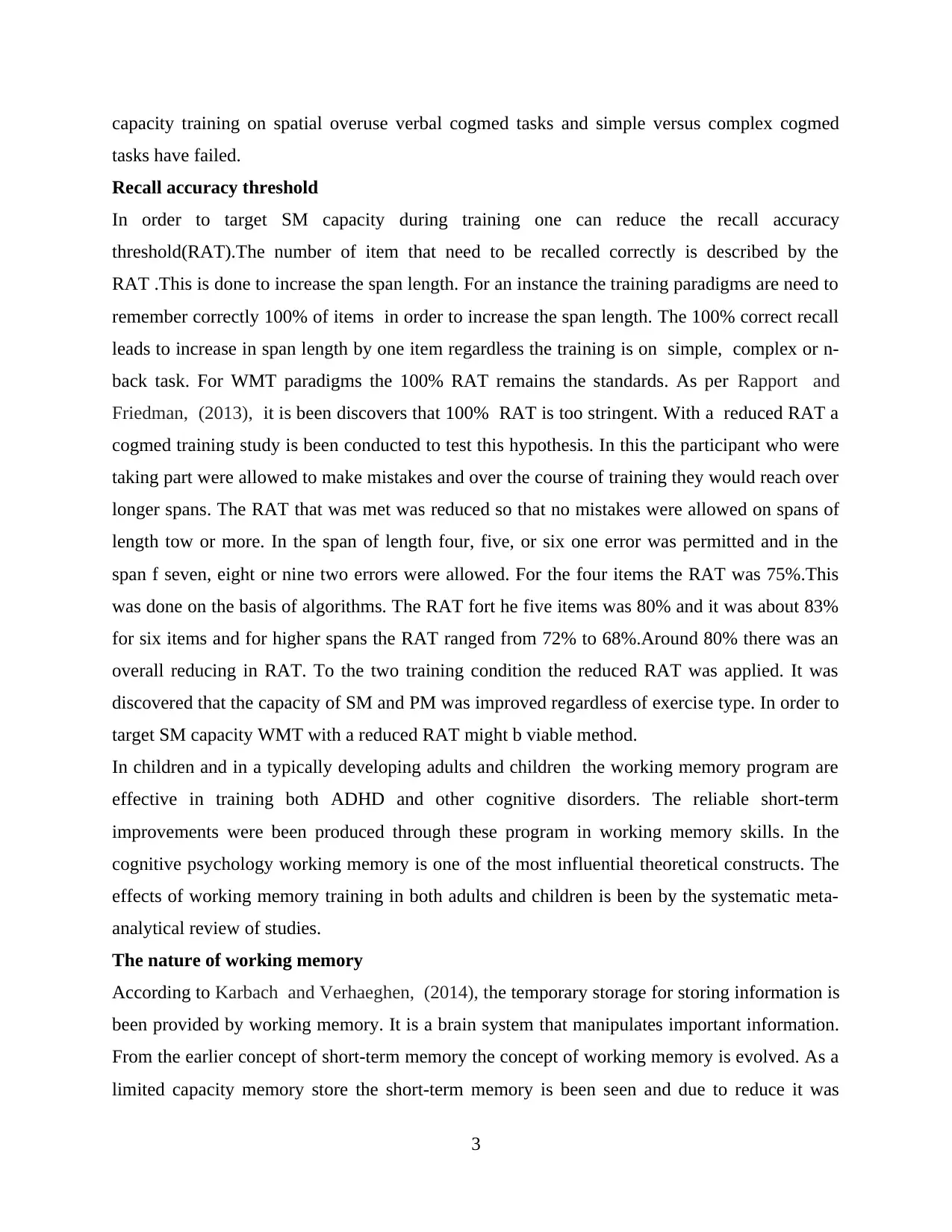
capacity training on spatial overuse verbal cogmed tasks and simple versus complex cogmed
tasks have failed.
Recall accuracy threshold
In order to target SM capacity during training one can reduce the recall accuracy
threshold(RAT).The number of item that need to be recalled correctly is described by the
RAT .This is done to increase the span length. For an instance the training paradigms are need to
remember correctly 100% of items in order to increase the span length. The 100% correct recall
leads to increase in span length by one item regardless the training is on simple, complex or n-
back task. For WMT paradigms the 100% RAT remains the standards. As per Rapport and
Friedman, (2013), it is been discovers that 100% RAT is too stringent. With a reduced RAT a
cogmed training study is been conducted to test this hypothesis. In this the participant who were
taking part were allowed to make mistakes and over the course of training they would reach over
longer spans. The RAT that was met was reduced so that no mistakes were allowed on spans of
length tow or more. In the span of length four, five, or six one error was permitted and in the
span f seven, eight or nine two errors were allowed. For the four items the RAT was 75%.This
was done on the basis of algorithms. The RAT fort he five items was 80% and it was about 83%
for six items and for higher spans the RAT ranged from 72% to 68%.Around 80% there was an
overall reducing in RAT. To the two training condition the reduced RAT was applied. It was
discovered that the capacity of SM and PM was improved regardless of exercise type. In order to
target SM capacity WMT with a reduced RAT might b viable method.
In children and in a typically developing adults and children the working memory program are
effective in training both ADHD and other cognitive disorders. The reliable short-term
improvements were been produced through these program in working memory skills. In the
cognitive psychology working memory is one of the most influential theoretical constructs. The
effects of working memory training in both adults and children is been by the systematic meta-
analytical review of studies.
The nature of working memory
According to Karbach and Verhaeghen, (2014), the temporary storage for storing information is
been provided by working memory. It is a brain system that manipulates important information.
From the earlier concept of short-term memory the concept of working memory is evolved. As a
limited capacity memory store the short-term memory is been seen and due to reduce it was
3
tasks have failed.
Recall accuracy threshold
In order to target SM capacity during training one can reduce the recall accuracy
threshold(RAT).The number of item that need to be recalled correctly is described by the
RAT .This is done to increase the span length. For an instance the training paradigms are need to
remember correctly 100% of items in order to increase the span length. The 100% correct recall
leads to increase in span length by one item regardless the training is on simple, complex or n-
back task. For WMT paradigms the 100% RAT remains the standards. As per Rapport and
Friedman, (2013), it is been discovers that 100% RAT is too stringent. With a reduced RAT a
cogmed training study is been conducted to test this hypothesis. In this the participant who were
taking part were allowed to make mistakes and over the course of training they would reach over
longer spans. The RAT that was met was reduced so that no mistakes were allowed on spans of
length tow or more. In the span of length four, five, or six one error was permitted and in the
span f seven, eight or nine two errors were allowed. For the four items the RAT was 75%.This
was done on the basis of algorithms. The RAT fort he five items was 80% and it was about 83%
for six items and for higher spans the RAT ranged from 72% to 68%.Around 80% there was an
overall reducing in RAT. To the two training condition the reduced RAT was applied. It was
discovered that the capacity of SM and PM was improved regardless of exercise type. In order to
target SM capacity WMT with a reduced RAT might b viable method.
In children and in a typically developing adults and children the working memory program are
effective in training both ADHD and other cognitive disorders. The reliable short-term
improvements were been produced through these program in working memory skills. In the
cognitive psychology working memory is one of the most influential theoretical constructs. The
effects of working memory training in both adults and children is been by the systematic meta-
analytical review of studies.
The nature of working memory
According to Karbach and Verhaeghen, (2014), the temporary storage for storing information is
been provided by working memory. It is a brain system that manipulates important information.
From the earlier concept of short-term memory the concept of working memory is evolved. As a
limited capacity memory store the short-term memory is been seen and due to reduce it was
3
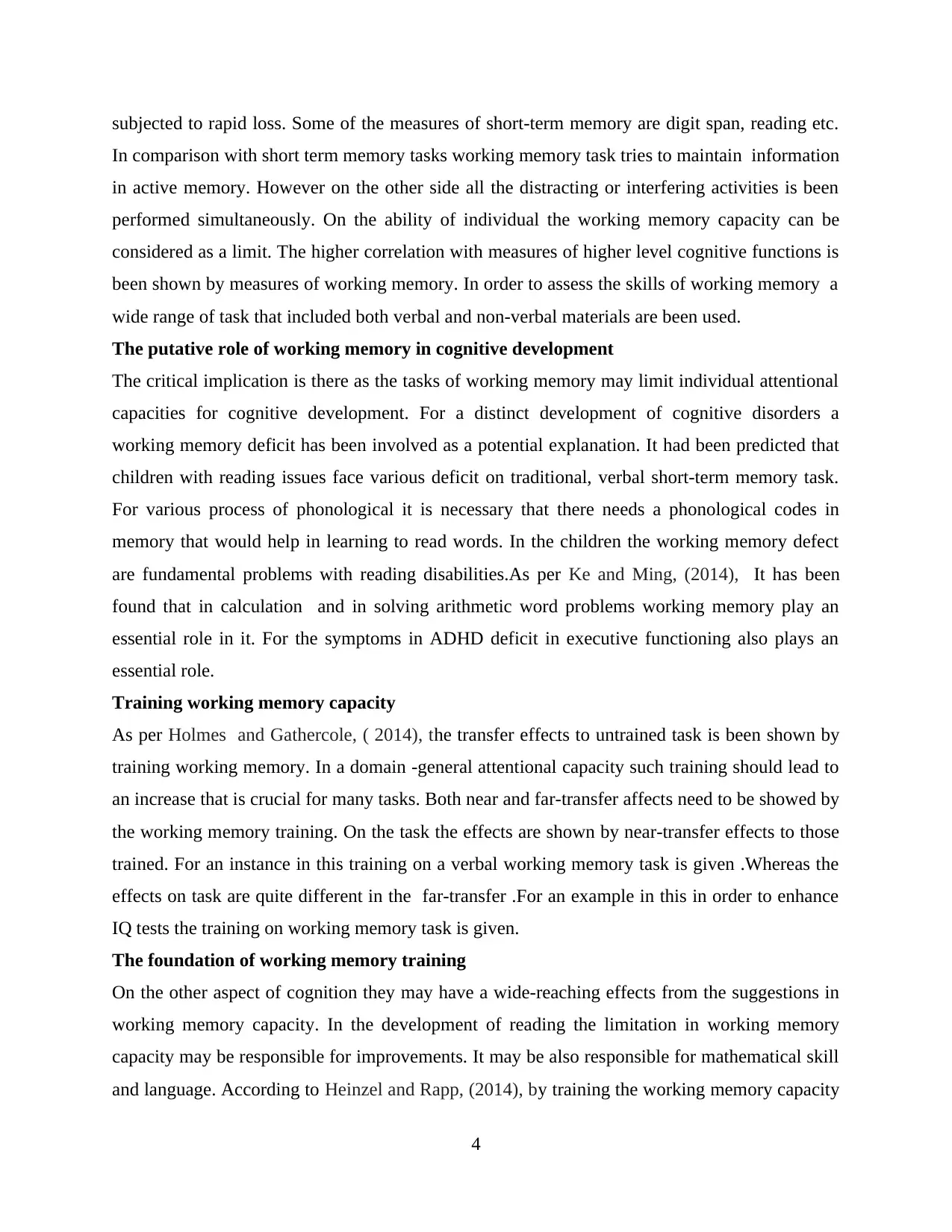
subjected to rapid loss. Some of the measures of short-term memory are digit span, reading etc.
In comparison with short term memory tasks working memory task tries to maintain information
in active memory. However on the other side all the distracting or interfering activities is been
performed simultaneously. On the ability of individual the working memory capacity can be
considered as a limit. The higher correlation with measures of higher level cognitive functions is
been shown by measures of working memory. In order to assess the skills of working memory a
wide range of task that included both verbal and non-verbal materials are been used.
The putative role of working memory in cognitive development
The critical implication is there as the tasks of working memory may limit individual attentional
capacities for cognitive development. For a distinct development of cognitive disorders a
working memory deficit has been involved as a potential explanation. It had been predicted that
children with reading issues face various deficit on traditional, verbal short-term memory task.
For various process of phonological it is necessary that there needs a phonological codes in
memory that would help in learning to read words. In the children the working memory defect
are fundamental problems with reading disabilities.As per Ke and Ming, (2014), It has been
found that in calculation and in solving arithmetic word problems working memory play an
essential role in it. For the symptoms in ADHD deficit in executive functioning also plays an
essential role.
Training working memory capacity
As per Holmes and Gathercole, ( 2014), the transfer effects to untrained task is been shown by
training working memory. In a domain -general attentional capacity such training should lead to
an increase that is crucial for many tasks. Both near and far-transfer affects need to be showed by
the working memory training. On the task the effects are shown by near-transfer effects to those
trained. For an instance in this training on a verbal working memory task is given .Whereas the
effects on task are quite different in the far-transfer .For an example in this in order to enhance
IQ tests the training on working memory task is given.
The foundation of working memory training
On the other aspect of cognition they may have a wide-reaching effects from the suggestions in
working memory capacity. In the development of reading the limitation in working memory
capacity may be responsible for improvements. It may be also responsible for mathematical skill
and language. According to Heinzel and Rapp, (2014), by training the working memory capacity
4
In comparison with short term memory tasks working memory task tries to maintain information
in active memory. However on the other side all the distracting or interfering activities is been
performed simultaneously. On the ability of individual the working memory capacity can be
considered as a limit. The higher correlation with measures of higher level cognitive functions is
been shown by measures of working memory. In order to assess the skills of working memory a
wide range of task that included both verbal and non-verbal materials are been used.
The putative role of working memory in cognitive development
The critical implication is there as the tasks of working memory may limit individual attentional
capacities for cognitive development. For a distinct development of cognitive disorders a
working memory deficit has been involved as a potential explanation. It had been predicted that
children with reading issues face various deficit on traditional, verbal short-term memory task.
For various process of phonological it is necessary that there needs a phonological codes in
memory that would help in learning to read words. In the children the working memory defect
are fundamental problems with reading disabilities.As per Ke and Ming, (2014), It has been
found that in calculation and in solving arithmetic word problems working memory play an
essential role in it. For the symptoms in ADHD deficit in executive functioning also plays an
essential role.
Training working memory capacity
As per Holmes and Gathercole, ( 2014), the transfer effects to untrained task is been shown by
training working memory. In a domain -general attentional capacity such training should lead to
an increase that is crucial for many tasks. Both near and far-transfer affects need to be showed by
the working memory training. On the task the effects are shown by near-transfer effects to those
trained. For an instance in this training on a verbal working memory task is given .Whereas the
effects on task are quite different in the far-transfer .For an example in this in order to enhance
IQ tests the training on working memory task is given.
The foundation of working memory training
On the other aspect of cognition they may have a wide-reaching effects from the suggestions in
working memory capacity. In the development of reading the limitation in working memory
capacity may be responsible for improvements. It may be also responsible for mathematical skill
and language. According to Heinzel and Rapp, (2014), by training the working memory capacity
4
⊘ This is a preview!⊘
Do you want full access?
Subscribe today to unlock all pages.

Trusted by 1+ million students worldwide
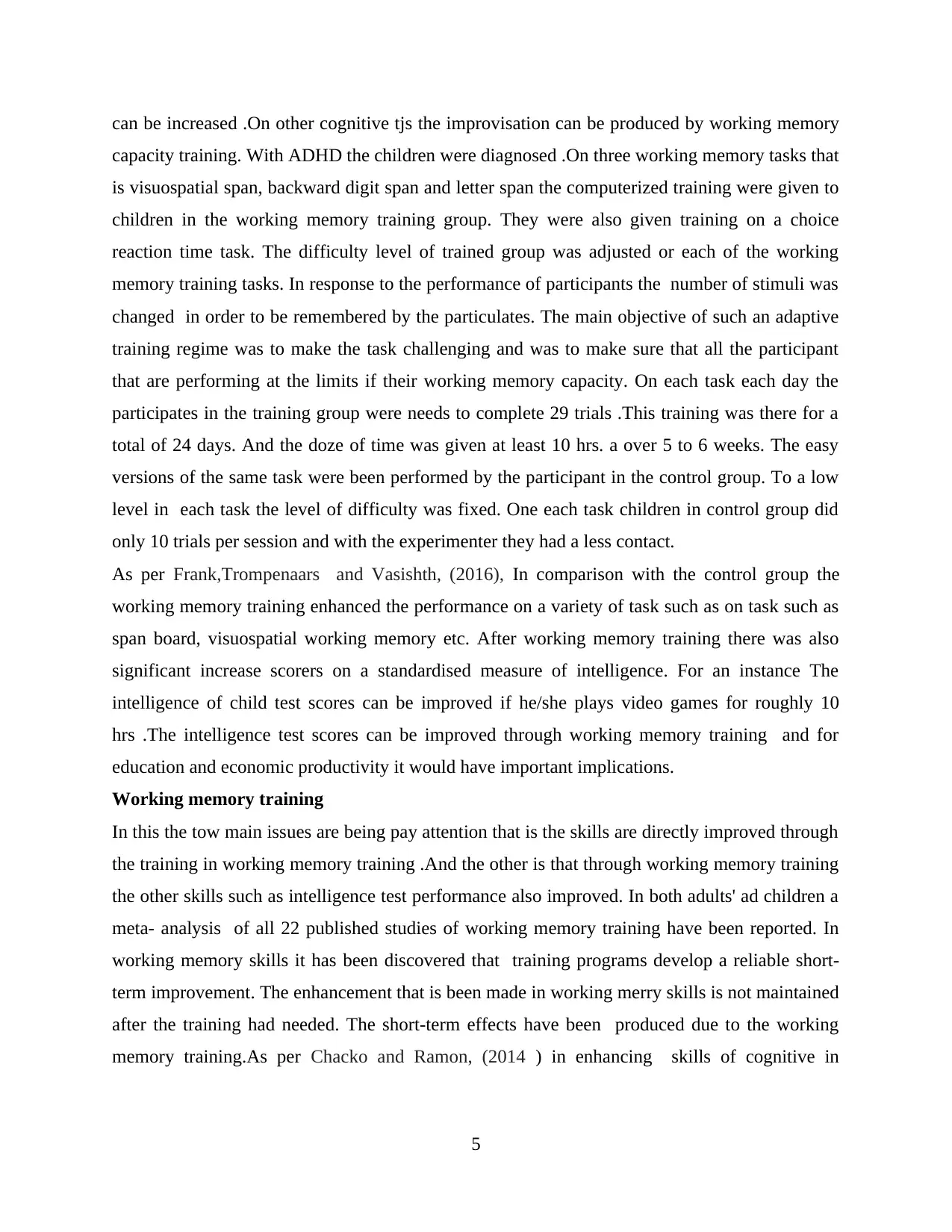
can be increased .On other cognitive tjs the improvisation can be produced by working memory
capacity training. With ADHD the children were diagnosed .On three working memory tasks that
is visuospatial span, backward digit span and letter span the computerized training were given to
children in the working memory training group. They were also given training on a choice
reaction time task. The difficulty level of trained group was adjusted or each of the working
memory training tasks. In response to the performance of participants the number of stimuli was
changed in order to be remembered by the particulates. The main objective of such an adaptive
training regime was to make the task challenging and was to make sure that all the participant
that are performing at the limits if their working memory capacity. On each task each day the
participates in the training group were needs to complete 29 trials .This training was there for a
total of 24 days. And the doze of time was given at least 10 hrs. a over 5 to 6 weeks. The easy
versions of the same task were been performed by the participant in the control group. To a low
level in each task the level of difficulty was fixed. One each task children in control group did
only 10 trials per session and with the experimenter they had a less contact.
As per Frank,Trompenaars and Vasishth, (2016), In comparison with the control group the
working memory training enhanced the performance on a variety of task such as on task such as
span board, visuospatial working memory etc. After working memory training there was also
significant increase scorers on a standardised measure of intelligence. For an instance The
intelligence of child test scores can be improved if he/she plays video games for roughly 10
hrs .The intelligence test scores can be improved through working memory training and for
education and economic productivity it would have important implications.
Working memory training
In this the tow main issues are being pay attention that is the skills are directly improved through
the training in working memory training .And the other is that through working memory training
the other skills such as intelligence test performance also improved. In both adults' ad children a
meta- analysis of all 22 published studies of working memory training have been reported. In
working memory skills it has been discovered that training programs develop a reliable short-
term improvement. The enhancement that is been made in working merry skills is not maintained
after the training had needed. The short-term effects have been produced due to the working
memory training.As per Chacko and Ramon, (2014 ) in enhancing skills of cognitive in
5
capacity training. With ADHD the children were diagnosed .On three working memory tasks that
is visuospatial span, backward digit span and letter span the computerized training were given to
children in the working memory training group. They were also given training on a choice
reaction time task. The difficulty level of trained group was adjusted or each of the working
memory training tasks. In response to the performance of participants the number of stimuli was
changed in order to be remembered by the particulates. The main objective of such an adaptive
training regime was to make the task challenging and was to make sure that all the participant
that are performing at the limits if their working memory capacity. On each task each day the
participates in the training group were needs to complete 29 trials .This training was there for a
total of 24 days. And the doze of time was given at least 10 hrs. a over 5 to 6 weeks. The easy
versions of the same task were been performed by the participant in the control group. To a low
level in each task the level of difficulty was fixed. One each task children in control group did
only 10 trials per session and with the experimenter they had a less contact.
As per Frank,Trompenaars and Vasishth, (2016), In comparison with the control group the
working memory training enhanced the performance on a variety of task such as on task such as
span board, visuospatial working memory etc. After working memory training there was also
significant increase scorers on a standardised measure of intelligence. For an instance The
intelligence of child test scores can be improved if he/she plays video games for roughly 10
hrs .The intelligence test scores can be improved through working memory training and for
education and economic productivity it would have important implications.
Working memory training
In this the tow main issues are being pay attention that is the skills are directly improved through
the training in working memory training .And the other is that through working memory training
the other skills such as intelligence test performance also improved. In both adults' ad children a
meta- analysis of all 22 published studies of working memory training have been reported. In
working memory skills it has been discovered that training programs develop a reliable short-
term improvement. The enhancement that is been made in working merry skills is not maintained
after the training had needed. The short-term effects have been produced due to the working
memory training.As per Chacko and Ramon, (2014 ) in enhancing skills of cognitive in
5
Paraphrase This Document
Need a fresh take? Get an instant paraphrase of this document with our AI Paraphraser
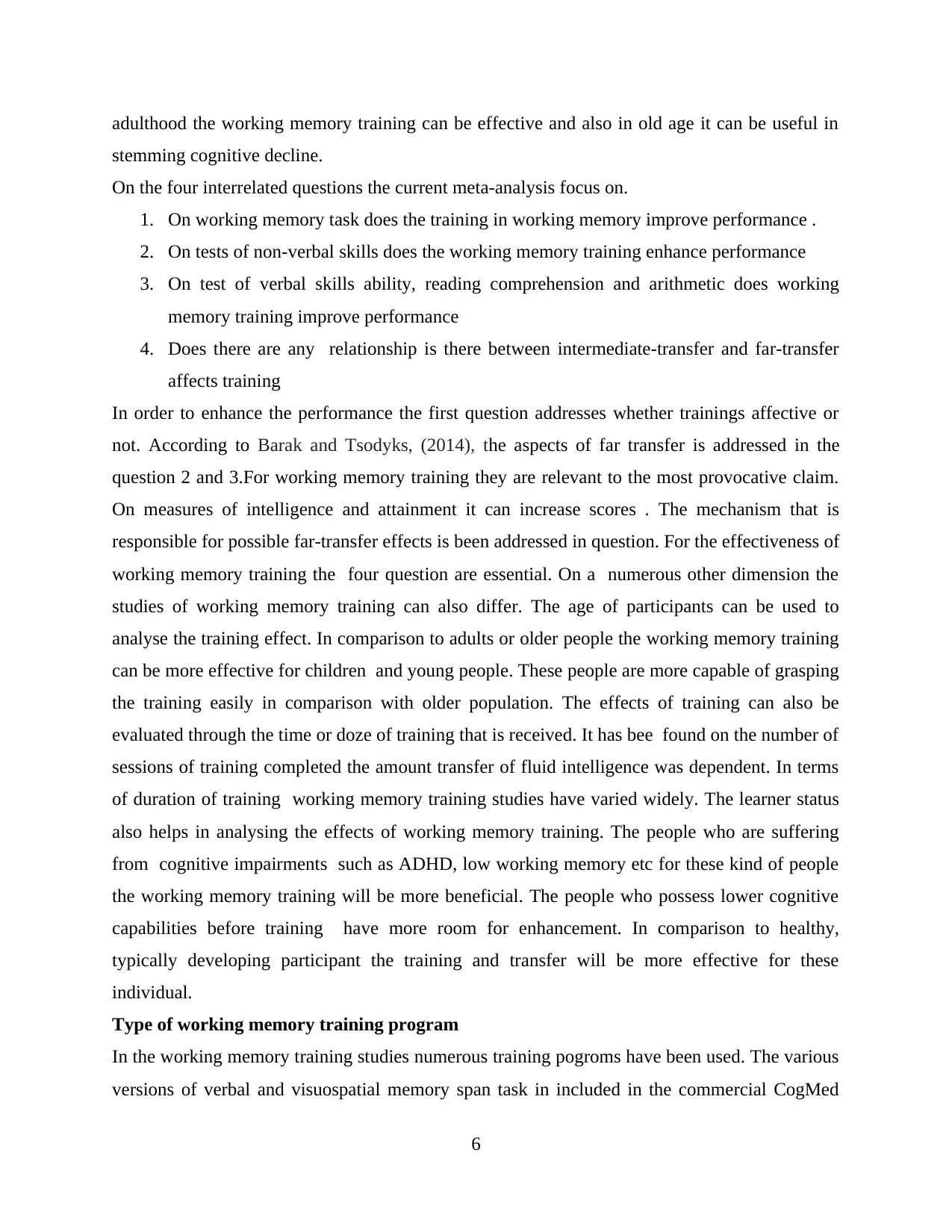
adulthood the working memory training can be effective and also in old age it can be useful in
stemming cognitive decline.
On the four interrelated questions the current meta-analysis focus on.
1. On working memory task does the training in working memory improve performance .
2. On tests of non-verbal skills does the working memory training enhance performance
3. On test of verbal skills ability, reading comprehension and arithmetic does working
memory training improve performance
4. Does there are any relationship is there between intermediate-transfer and far-transfer
affects training
In order to enhance the performance the first question addresses whether trainings affective or
not. According to Barak and Tsodyks, (2014), the aspects of far transfer is addressed in the
question 2 and 3.For working memory training they are relevant to the most provocative claim.
On measures of intelligence and attainment it can increase scores . The mechanism that is
responsible for possible far-transfer effects is been addressed in question. For the effectiveness of
working memory training the four question are essential. On a numerous other dimension the
studies of working memory training can also differ. The age of participants can be used to
analyse the training effect. In comparison to adults or older people the working memory training
can be more effective for children and young people. These people are more capable of grasping
the training easily in comparison with older population. The effects of training can also be
evaluated through the time or doze of training that is received. It has bee found on the number of
sessions of training completed the amount transfer of fluid intelligence was dependent. In terms
of duration of training working memory training studies have varied widely. The learner status
also helps in analysing the effects of working memory training. The people who are suffering
from cognitive impairments such as ADHD, low working memory etc for these kind of people
the working memory training will be more beneficial. The people who possess lower cognitive
capabilities before training have more room for enhancement. In comparison to healthy,
typically developing participant the training and transfer will be more effective for these
individual.
Type of working memory training program
In the working memory training studies numerous training pogroms have been used. The various
versions of verbal and visuospatial memory span task in included in the commercial CogMed
6
stemming cognitive decline.
On the four interrelated questions the current meta-analysis focus on.
1. On working memory task does the training in working memory improve performance .
2. On tests of non-verbal skills does the working memory training enhance performance
3. On test of verbal skills ability, reading comprehension and arithmetic does working
memory training improve performance
4. Does there are any relationship is there between intermediate-transfer and far-transfer
affects training
In order to enhance the performance the first question addresses whether trainings affective or
not. According to Barak and Tsodyks, (2014), the aspects of far transfer is addressed in the
question 2 and 3.For working memory training they are relevant to the most provocative claim.
On measures of intelligence and attainment it can increase scores . The mechanism that is
responsible for possible far-transfer effects is been addressed in question. For the effectiveness of
working memory training the four question are essential. On a numerous other dimension the
studies of working memory training can also differ. The age of participants can be used to
analyse the training effect. In comparison to adults or older people the working memory training
can be more effective for children and young people. These people are more capable of grasping
the training easily in comparison with older population. The effects of training can also be
evaluated through the time or doze of training that is received. It has bee found on the number of
sessions of training completed the amount transfer of fluid intelligence was dependent. In terms
of duration of training working memory training studies have varied widely. The learner status
also helps in analysing the effects of working memory training. The people who are suffering
from cognitive impairments such as ADHD, low working memory etc for these kind of people
the working memory training will be more beneficial. The people who possess lower cognitive
capabilities before training have more room for enhancement. In comparison to healthy,
typically developing participant the training and transfer will be more effective for these
individual.
Type of working memory training program
In the working memory training studies numerous training pogroms have been used. The various
versions of verbal and visuospatial memory span task in included in the commercial CogMed
6
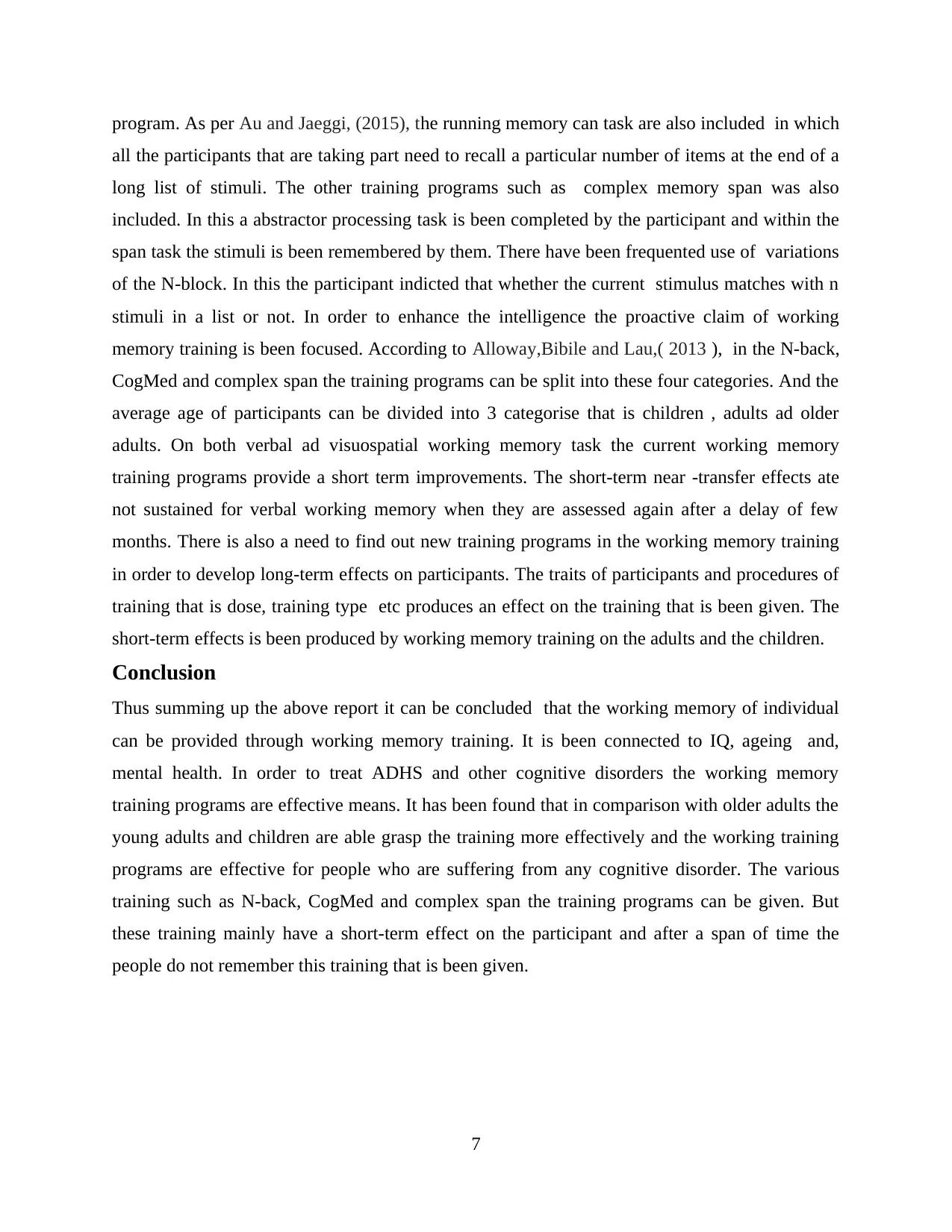
program. As per Au and Jaeggi, (2015), the running memory can task are also included in which
all the participants that are taking part need to recall a particular number of items at the end of a
long list of stimuli. The other training programs such as complex memory span was also
included. In this a abstractor processing task is been completed by the participant and within the
span task the stimuli is been remembered by them. There have been frequented use of variations
of the N-block. In this the participant indicted that whether the current stimulus matches with n
stimuli in a list or not. In order to enhance the intelligence the proactive claim of working
memory training is been focused. According to Alloway,Bibile and Lau,( 2013 ), in the N-back,
CogMed and complex span the training programs can be split into these four categories. And the
average age of participants can be divided into 3 categorise that is children , adults ad older
adults. On both verbal ad visuospatial working memory task the current working memory
training programs provide a short term improvements. The short-term near -transfer effects ate
not sustained for verbal working memory when they are assessed again after a delay of few
months. There is also a need to find out new training programs in the working memory training
in order to develop long-term effects on participants. The traits of participants and procedures of
training that is dose, training type etc produces an effect on the training that is been given. The
short-term effects is been produced by working memory training on the adults and the children.
Conclusion
Thus summing up the above report it can be concluded that the working memory of individual
can be provided through working memory training. It is been connected to IQ, ageing and,
mental health. In order to treat ADHS and other cognitive disorders the working memory
training programs are effective means. It has been found that in comparison with older adults the
young adults and children are able grasp the training more effectively and the working training
programs are effective for people who are suffering from any cognitive disorder. The various
training such as N-back, CogMed and complex span the training programs can be given. But
these training mainly have a short-term effect on the participant and after a span of time the
people do not remember this training that is been given.
7
all the participants that are taking part need to recall a particular number of items at the end of a
long list of stimuli. The other training programs such as complex memory span was also
included. In this a abstractor processing task is been completed by the participant and within the
span task the stimuli is been remembered by them. There have been frequented use of variations
of the N-block. In this the participant indicted that whether the current stimulus matches with n
stimuli in a list or not. In order to enhance the intelligence the proactive claim of working
memory training is been focused. According to Alloway,Bibile and Lau,( 2013 ), in the N-back,
CogMed and complex span the training programs can be split into these four categories. And the
average age of participants can be divided into 3 categorise that is children , adults ad older
adults. On both verbal ad visuospatial working memory task the current working memory
training programs provide a short term improvements. The short-term near -transfer effects ate
not sustained for verbal working memory when they are assessed again after a delay of few
months. There is also a need to find out new training programs in the working memory training
in order to develop long-term effects on participants. The traits of participants and procedures of
training that is dose, training type etc produces an effect on the training that is been given. The
short-term effects is been produced by working memory training on the adults and the children.
Conclusion
Thus summing up the above report it can be concluded that the working memory of individual
can be provided through working memory training. It is been connected to IQ, ageing and,
mental health. In order to treat ADHS and other cognitive disorders the working memory
training programs are effective means. It has been found that in comparison with older adults the
young adults and children are able grasp the training more effectively and the working training
programs are effective for people who are suffering from any cognitive disorder. The various
training such as N-back, CogMed and complex span the training programs can be given. But
these training mainly have a short-term effect on the participant and after a span of time the
people do not remember this training that is been given.
7
⊘ This is a preview!⊘
Do you want full access?
Subscribe today to unlock all pages.

Trusted by 1+ million students worldwide
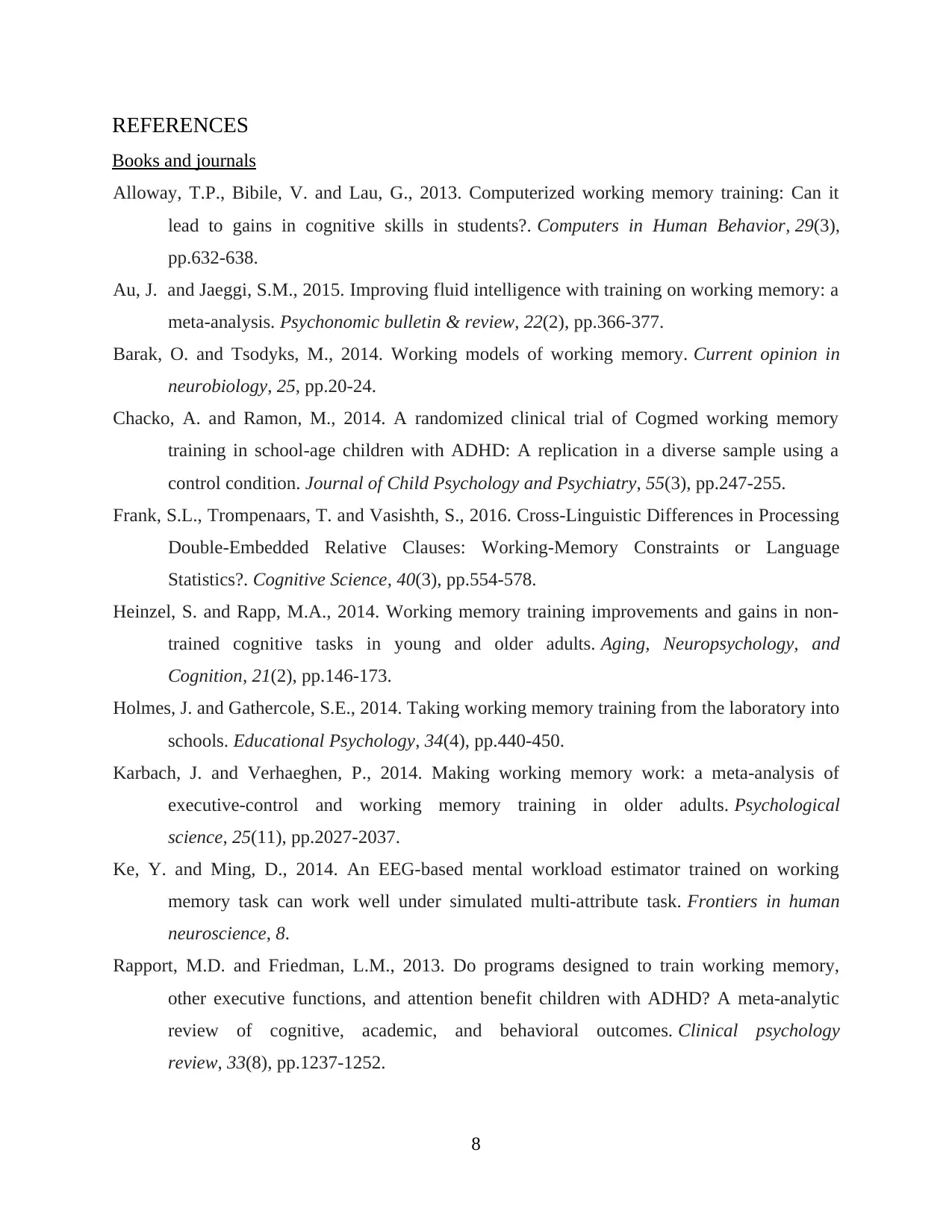
REFERENCES
Books and journals
Alloway, T.P., Bibile, V. and Lau, G., 2013. Computerized working memory training: Can it
lead to gains in cognitive skills in students?. Computers in Human Behavior, 29(3),
pp.632-638.
Au, J. and Jaeggi, S.M., 2015. Improving fluid intelligence with training on working memory: a
meta-analysis. Psychonomic bulletin & review, 22(2), pp.366-377.
Barak, O. and Tsodyks, M., 2014. Working models of working memory. Current opinion in
neurobiology, 25, pp.20-24.
Chacko, A. and Ramon, M., 2014. A randomized clinical trial of Cogmed working memory
training in school‐age children with ADHD: A replication in a diverse sample using a
control condition. Journal of Child Psychology and Psychiatry, 55(3), pp.247-255.
Frank, S.L., Trompenaars, T. and Vasishth, S., 2016. Cross‐Linguistic Differences in Processing
Double‐Embedded Relative Clauses: Working‐Memory Constraints or Language
Statistics?. Cognitive Science, 40(3), pp.554-578.
Heinzel, S. and Rapp, M.A., 2014. Working memory training improvements and gains in non-
trained cognitive tasks in young and older adults. Aging, Neuropsychology, and
Cognition, 21(2), pp.146-173.
Holmes, J. and Gathercole, S.E., 2014. Taking working memory training from the laboratory into
schools. Educational Psychology, 34(4), pp.440-450.
Karbach, J. and Verhaeghen, P., 2014. Making working memory work: a meta-analysis of
executive-control and working memory training in older adults. Psychological
science, 25(11), pp.2027-2037.
Ke, Y. and Ming, D., 2014. An EEG-based mental workload estimator trained on working
memory task can work well under simulated multi-attribute task. Frontiers in human
neuroscience, 8.
Rapport, M.D. and Friedman, L.M., 2013. Do programs designed to train working memory,
other executive functions, and attention benefit children with ADHD? A meta-analytic
review of cognitive, academic, and behavioral outcomes. Clinical psychology
review, 33(8), pp.1237-1252.
8
Books and journals
Alloway, T.P., Bibile, V. and Lau, G., 2013. Computerized working memory training: Can it
lead to gains in cognitive skills in students?. Computers in Human Behavior, 29(3),
pp.632-638.
Au, J. and Jaeggi, S.M., 2015. Improving fluid intelligence with training on working memory: a
meta-analysis. Psychonomic bulletin & review, 22(2), pp.366-377.
Barak, O. and Tsodyks, M., 2014. Working models of working memory. Current opinion in
neurobiology, 25, pp.20-24.
Chacko, A. and Ramon, M., 2014. A randomized clinical trial of Cogmed working memory
training in school‐age children with ADHD: A replication in a diverse sample using a
control condition. Journal of Child Psychology and Psychiatry, 55(3), pp.247-255.
Frank, S.L., Trompenaars, T. and Vasishth, S., 2016. Cross‐Linguistic Differences in Processing
Double‐Embedded Relative Clauses: Working‐Memory Constraints or Language
Statistics?. Cognitive Science, 40(3), pp.554-578.
Heinzel, S. and Rapp, M.A., 2014. Working memory training improvements and gains in non-
trained cognitive tasks in young and older adults. Aging, Neuropsychology, and
Cognition, 21(2), pp.146-173.
Holmes, J. and Gathercole, S.E., 2014. Taking working memory training from the laboratory into
schools. Educational Psychology, 34(4), pp.440-450.
Karbach, J. and Verhaeghen, P., 2014. Making working memory work: a meta-analysis of
executive-control and working memory training in older adults. Psychological
science, 25(11), pp.2027-2037.
Ke, Y. and Ming, D., 2014. An EEG-based mental workload estimator trained on working
memory task can work well under simulated multi-attribute task. Frontiers in human
neuroscience, 8.
Rapport, M.D. and Friedman, L.M., 2013. Do programs designed to train working memory,
other executive functions, and attention benefit children with ADHD? A meta-analytic
review of cognitive, academic, and behavioral outcomes. Clinical psychology
review, 33(8), pp.1237-1252.
8
Paraphrase This Document
Need a fresh take? Get an instant paraphrase of this document with our AI Paraphraser
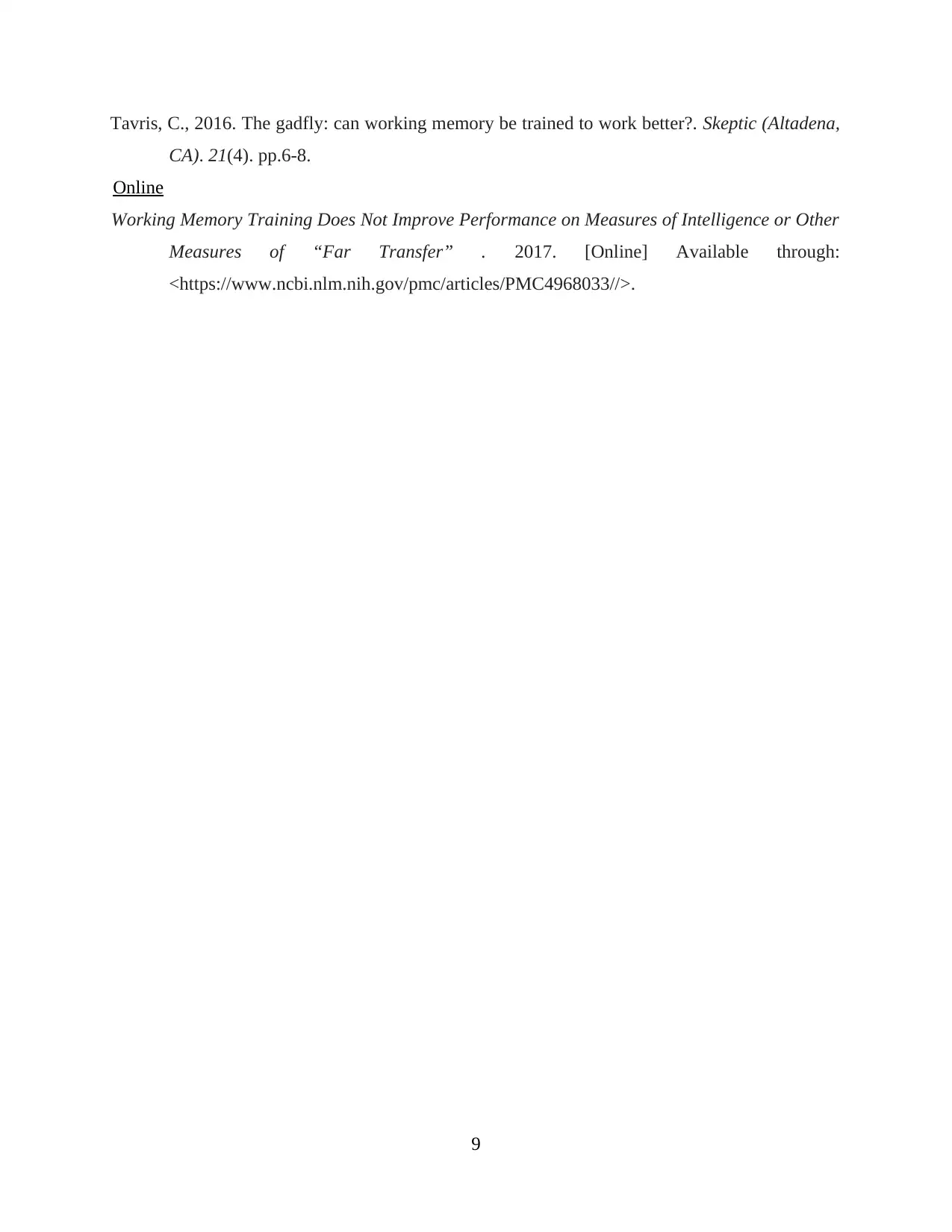
Tavris, C., 2016. The gadfly: can working memory be trained to work better?. Skeptic (Altadena,
CA). 21(4). pp.6-8.
Online
Working Memory Training Does Not Improve Performance on Measures of Intelligence or Other
Measures of “Far Transfer” . 2017. [Online] Available through:
<https://www.ncbi.nlm.nih.gov/pmc/articles/PMC4968033//>.
9
CA). 21(4). pp.6-8.
Online
Working Memory Training Does Not Improve Performance on Measures of Intelligence or Other
Measures of “Far Transfer” . 2017. [Online] Available through:
<https://www.ncbi.nlm.nih.gov/pmc/articles/PMC4968033//>.
9
1 out of 11
Related Documents
Your All-in-One AI-Powered Toolkit for Academic Success.
+13062052269
info@desklib.com
Available 24*7 on WhatsApp / Email
![[object Object]](/_next/static/media/star-bottom.7253800d.svg)
Unlock your academic potential
Copyright © 2020–2026 A2Z Services. All Rights Reserved. Developed and managed by ZUCOL.





